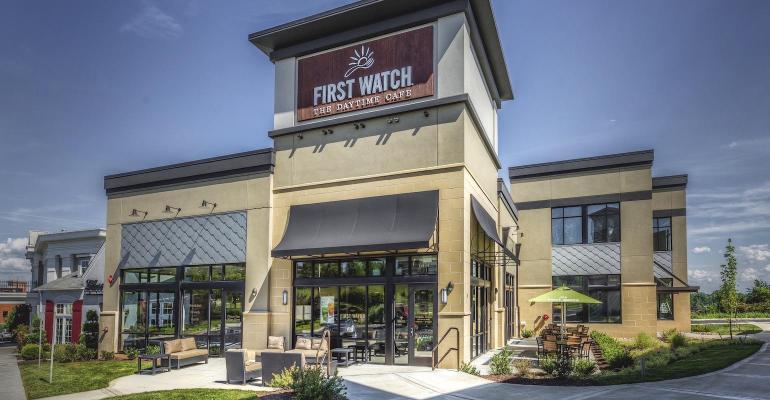First Watch has grown significantly in the past five years, nearly doubling its footprint from 2017-2022 while growing sales by over 192%, according to Technomic Ignite data. Much of that growth was fueled by a successful IPO in late 2021, in which the company raised more than $170 million.
Despite this pace, Chief Brand Officer Matt Eisenacher said the company’s priorities haven’t changed; its primary focus is on expanding its footprint but doing so in a sort-of under-the-radar-type of way.
“We’re in 29 states now, which a lot of people are surprised to hear. Our awareness is low, but that’s by design,” Eisenacher said during a recent interview. “We don’t want to be known as a chain.”
That may come as a surprise given the company’s recent trends and plans for what’s next, including a long-term aspiration to get to 2,200 units from its current about 525 locations. First Watch’s strategy to maintain its anti-chain approach is straightforward – each restaurant is designed uniquely; the company doesn’t do a lot of mass advertising, relying instead on word-of-mouth; the company spends much of its focus on menu innovation despite the additional training involved; and the leadership team, spanning all functions, meets every Monday to keep these objectives in check.
“We choose to do things the hard way. Sitting there every Monday and designing every restaurant; we don’t just take prototype A and say ‘go,’” he said. “We’re changing our menu five times a year – that’s new items your teams have to learn, build, get in a rhythm doing and start again in 10 weeks. Those are things that a local or small company would do. Mentality-wise, we don’t let ourselves get into the mindset of let’s plug and chug it because we’re growing. There’s something about breakfast that you want it to be your location. That goes back to not wanting to be known as a chain.”
The First Watch team is confident they’ll be able to maintain this approach because they’ve been doing it for years. Prior to going public, for instance, the company made two acquisitions, including The Egg & I in 2015. Within a few years, all of those restaurants were converted into unique First Watch locations.
“Converting restaurants is in some ways more difficult. You’re changing culture, team, customers. We’ve done that for a long period of time. It’s a core competency for us. We have a separate team that does our openings, so it’s all they focus on,” Eisenacher said.
Eisenacher added that the corporate-run brand can be “a little bit boring,” working on fundamentals instead of bells-and-whistles marketing. That’s not to say there haven’t been any changes, however. First Watch’s north star is its seasonal menu, which Eisenacher called “our best form of marketing.” Its alcohol platform is in its “final innings of the systemwide rollout,” a process that has taken about two years and now generates about 6% of the sales mix. Eisenacher said the company will shift to innovating along the alcohol platform, just as it does its seasonal menus, but adds that First Watch won’t likely ever be known as a “boozy brunch” spot like some of its competitors.
“It’s not who we are. I want you to feel comfy coming on a Saturday and having a cocktail, but also on a Wednesday for a power breakfast meeting,” he said.
The intention behind avoiding a chain-like environment while prioritizing menu and restaurant innovation is what Eisenacher says will differentiate First Watch as the breakfast/brunch category overall continues to grow at a quick pace.
“The space is growing, but there is still a lot of room. Breakfast is completely underserved. The best operators are the ones focused on the fundamentals. If our servers are happy and we continue to create novel environments and we continue to innovate around our seasonal menu program, the rest is going to take care of itself,” he said. “Our focus is not to react to the short term. We’re in this for the long run.”
Contact Alicia Kelso at [email protected]

